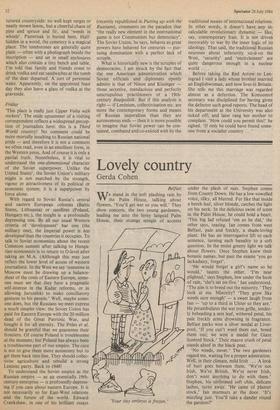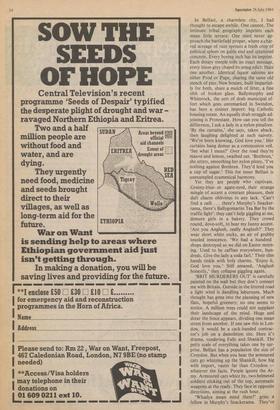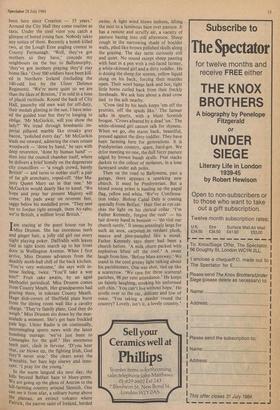Lovely country
Gerda Cohen
Belfast
We stand in the soft plashing rain by the Palm House, talking about flowers. 'You'll get wet so you will.' They show concern, the two young gardeners, leading me into the ferny languid Palm House, their strange mingle of accents
'Your tiny embryo is frozen.'
under the plash of rain. Stephen comes from County Down. He has a low-vowelled voice, silky, all blurred. Fur like that inside a beech leaf, silver blonde, catches the light on his neck. In the delicious swim of scent in the Palm House, he could hold a heart. 'This big lad refused 'em so he did,' the other says, teasing. Ian comes from west Belfast, pale and freckly, a shade-loving plant. He has an interrogative lift to each sentence, turning each banality to a soft question. In the moist greeny light we talk about flowers. Once Stephen knew their botanic names, but past the exams 'you go lackadaisy, forget'.
'He would forget a girl's name so he would,' taunts the other. 'I'm near plighted,' says Stephen, low under the hush of rain, 'she's set on five.' Ian understood. 'The aim is to breed out the minority.' They look at me. Minority? 'They grow like weeds sure enough' — a sweet laugh from Ian — `up to a third in Ulster so they are.' He perambulates the wet iron grille, tender- ly beheading a sere leaf, withered petal, his pale freckly arms drowning in fragrance. Belfast parks won a silver medal at Liver- pool. 'If you can't weed them out, breed them out; we won a medal for Giant Scented Stock.' Their mauve crush of petal stands aloof in the black peat.
`No weeds, never.' The two gardeners regard me, waiting for a proper admiration. Well, in their climate, mild Irish ... A look of hurt goes between them. 'We're not Irish. We're British. We're never Irish, don't want anything to do with them.' Stephen, his unformed soft chin, delicate lashes, turns away. 'He came of planter stock,' Ian murmurs at the door. 'It's mizzling just. You'll take a dander round the gardens?' In Belfast, a charmless city, I had thought to escape awhile. One cannot. The intimate tribal geography imprints each mean little terrace. One need never ap- proach the battlefield proper, where a char- red acreage of ruin sprouts a fresh crop of political spleen on gable end and splattered concrete. Every boring inch has its imprint. Each dreary steeple tolls an exact message, every louse-grey chapel its smug edict: Hate one another. Identical liquor saloons are either Prod or Pape, sharing the same old stench of piss. New houses, built impartial- ly for both, share a mulch of litter, a fine tilth of broken glass. Ballymurphy and Whiterock, the sort of drab municipal ef- fort which goes unremarked in Swindon, has here a sinister import: big Catholic housing estate. An equally drab straggle ad- joining is Protestant. How can you tell the difference, I ask a lady in a nylon pinafore. `By the curtains,' she says, taken aback, then laughing delighted at such naivety. `We're born knowing, God love you.' Her curtains hang demur as a communion veil. 'See what I mean?' Over the road they're mauve and lemon, swathed net. 'Brethren,' she utters, smoothing her nylon pinny, 'I've nothing against Brethren. They'd lend you a cup of sugar.' This for inner Belfast is unexampled ecumenical harmony.
Yet they are people who captivate. Greeny-blue- or agate-eyed, their strange mingle of accent a constant pleasure, their daft charm oblivious to any lack. 'Can't find a cafe ... there's Murphy's Snacker- rama, there's Ballygomartin Tea Bar by the traffic light': they can't help giggling at me, demure girls in a bakery. They crowd round, dove-soft, to hear my funny accent. 'Are you Anglush, really Anglush?' They wear short white socks, an air of grubby tousled innocence. 'We had a hundred shops destroyed so we did on Easter morn- ing. Used to be caffees everywhere, hun- dreds. Give the lady a soda farl.' Their slim hands tinkle with holy charms. 'Enjoy it, God love you.' Still amazed, 'Anglush honestly,' they collapse giggling again.
'BRIT MURDERERS OUT' is carefully painted on the wall but they don't connect me with Britain. Outside in the littered road a light wind is dandling laburnum. Much thought has gone into the planning of new flats, hopeful greenery; no one seems to notice. A million trees could not supplant their landscape of the mind. Huge and drear the fence appears, dividing one mean street from another. If one saw this in Lon- don, it would be a cack-handed contrac- tor's job on a demolition site. Here it's drama, sundering Falls and Shankill. The petty scale of everything takes one by sur- prise. Belfast has a population the size of Croydon. But when you hear the armoured cars go whizzing up the Shankill, how big with import, vaster far than Croydon whatever the facts. People ignore the Ar- my. Armoured cars whizz by, two helmeted soldiers sticking out of the top, automatic weapons at the ready. They face in opposite directions, aiming at the rush hour.
'Whadya mean mind them?' grins a fellow in Murphy's Snackerama. They've been here since Creation — 15 years.' Around the City Hall they come routine as taxis. Under the steel vizor you catch a glimpse of bored young face. Nobody takes any notice of them. Recently a bomb killed two, at the Lough Erne angling contest in County Fermanagh. 'Well, they've got mothers so they have,' concede my neighbours on the bus to Ballymurphy, `they've got mothers praying they'd stay home like.' Over 500 soldiers have been kill- ed in Northern Ireland (including the 140-odd lost by the Ulster Defence Regiment). 'We're more quiet so we are than the likes of Brixton,' I'm told in a tone of placid rectitude. Round the back of City Hall, paunchy old men wait for off-duty, their medals glinting in the sun. I have miss- ed the guided tour but they're longing to oblige. `Mr McGurkin, will you show the lady?' We tread through bombastic im- perial pillared marble like streaky grey bacon, 'polished every day'. Mr McGurkin leads me onward, admiring the crass ornate woodwork — 'done by hand,' he says with deep reverence, 'done by human hand' then into the council chamber itself, where he delivers a brief homily on the degenerate city councillors — 'a rough crowd, barely British' — and turns to nobler stuff: a pair of fat gilt armchairs, roped-off. 'Her Ma- jesty Queen Mary sat in that one.' Mr McGurkin would dearly like to kneel. 'We hope and pray her present Majesty will come.' He pads away on reverent feet, saggy below his medalled prow. 'They sent her to Jordan right enough, them Ay-rabs; we're British, a million loyal British.'
Iam staying at the guest house run by Miss Drumm. She has enormous teeth and ginger hair, a jolly old girl out every night playing poker. Daffodils with leaves tied in tight knots march up to her front door in Wellington Avenue. When I first arrive, Miss Drumm advances from the deathly moth-ball chill of the back kitchen. `You're very welcome,' she says with in- tense feeling, twice. 'You'll take a wee bite?' Fruit cake awaits, by an aged Methodist periodical. Miss Drumm comes from County Meath. Her grandparents had grazing there, in tolerant County Meath. Huge dish-covers of Sheffield plate burst from the dining room wall like a cavalry charge. 'They're family plate, God they do weigh.' Miss Drumm sits down by the mar- malade a moment. She's got bare freckled pale legs. Ulster Radio is on continually, intermingling sports news with the latest bombing outrage: 'we've just been to Gleneagles for the golf.' Her enormous teeth part, clash in fervour. 'D'you hear that, car blown up, the fighting Irish, God they'll never stop.' She clears away the Weetabix, her bare legs sinewy and inno- cent. 'I pray for the young.'
In the warm languid sky next day, the hills beyond Belfast haze to bluey-green. We are going up the glens of Antrim to the hill-farming country around Slemish. One can see it from afar, a solitary hump above the plateau, an extinct volcano where Patrick, the patron saint of Ireland, herded swine. A light wind blows inshore, lifting the mist to a luminous haze over pasture. It has a remote and scruffy air, a vacuity of pasture hazing into still afternoon. Sheep cough in the narrowing shade of boulder walls, piled like brown polished skulls along the grazing. The day turns curiously still and quiet. No sound except sheep panting with heat in a pen with a red-faced farmer, a white-skinned girl and a dirty toddler. He is dosing the sheep for worms, yellow liquid slung on his back, forcing their muzzles open. Their wool hangs lank and hot, tight little horns curled back from their freckly foreheads. We ask him about a dead crow tied to the ash nearby.
`Crow tied by his heels keeps 'em off the prutties, off the spuds like.' The farmer talks in spurts, with a blunt Scottish brogue. 'Crows afeared by a dead 'un.' The white-skinned girl cannot talk for shyness. When we go, she stares back, beautiful, pressed against the dirty toddler. They have been farming here for generations. It is Presbyterian country, spare, hard-got. We drive meeting no one, the dull furzy pasture edged by brown basalt skulls. Peat stacks darken to the colour of molasses, in a lone farmyard under ash poles.
Then on the road to Ballymena, past a garage, there appears a spanking new church. It must be Presbyterian. But a blond young priest is hauling up the papal flag, yellow and white. 'We've Confirma- tion today. Bishop Cahal Daly is coming specially from Belfast.' Hair fine as rye cat- ches the light on his clerical collar. `I'm Father Kennedy, forgive the rush' — his fair downy hand in benison — `do visit our church surely.' It seems amazingly large for such an area, carpeted in verdant plush, mauve and pine-panelled like a motel. Father Kennedy says there had been a church before. 'A milk churn packed with explosives lifted off the roof.' A sweet laugh from him. 'Before Mass anyway.' We stand in the cool greeny light talking about his parishioners. One was shot, tied up like a scarecrow. 'We care for three scattered parishes, 98 per cent attendance.' He keeps on faintly laughing, stroking his unformed soft chin.' You can't live without hope.' He strolls over to the car, delicate and low of voice. 'You taking a dander round the country? Lovely, isn't it, a lovely country.'












































 Previous page
Previous page